- Home
- Jeanne Kalogridis
I, Mona Lisa Page 7
I, Mona Lisa Read online
Page 7
Quite suddenly and unprompted, he said, Pay no attention to custom, my boy. I had half your talent—yes, I was good at drawing and eager, like you, to understand how the natural world works—but I listened to my father. Before I came to the farm, I was apprenticed to him as a notary.
That is what we are—a family of notaries. One sired me, and so I sired one myself—your father. What have we given the world? Contracts and bills of exchange, and signatures on documents which will turn to dust.
I did not give up my dreams altogether; even as I learned about the profession, I drew in secret. I stared at birds and rivers, and wondered how they worked. But then I met your grandmother Lucia and fell in love. It was the worst thing ever to happen, for I abandoned art and science and married her. Then there were children, and no time to look at trees. Lucia found my scribblings and cast them into the fire.
But God has given us you—you with your amazing mind and eyes and hands. You have a duty not to abandon them.
Promise me you will not make my mistake; promise me you will never let your heart carry you away.
Young Leonardo had promised.
But when he became a protégé of the Medici and a member of their inner circle, he had been drawn, physically and emotionally, to Lorenzo’s younger brother. Giuliano was infinitely lovable. It was not simply the man’s striking appearance—Leonardo was himself far more attractive, often called “beautiful” by his friends—but rather the pure goodness of his spirit.
This fact Leonardo kept to himself. He did not wish to make Giuliano, a lover of women, uncomfortable; nor did he care to scandalize Lorenzo, his host and patron.
When Giuliano appeared in the Duomo, Leonardo—only two rows behind him, for he had made his way as close as possible to Lorenzo, the better to intercept him—could not help but stare steadily at him. He noted Giuliano’s downcast demeanor, and was filled with neither sympathy nor attraction but with a welling of bitter jealousy.
The previous evening, the artist had set out with the intention of speaking to Lorenzo about the commission.
He had made his way onto the Via de’ Gori, past the church of San Lorenzo. The Palazzo Medici lay just ahead, to his left, and he stepped out into the street toward it.
It was dusk. To the west lay the high, narrow tower of the Palazzo della Signoria and the great curving cupola of the Duomo, distinct and dark against an impossible horizon of incandescent coral fading gradually to lavender, then gray. Given the hour, traffic was light, and Leonardo paused in the street, lost in the beauty of his surroundings. He watched as a carriage rolled toward him, and enjoyed the crisp silhouettes of the horses, their bodies impenetrably black, set against the backdrop of the brilliant sky with the sun behind them, so that all detail was swallowed. Sundown was his favorite hour, for the failing light infused forms and colors with a tenderness, a sense of gentle mystery, that the noon sun burned away.
He grew lost in the play of shadow on the horses’ bodies, on the rippling of muscles beneath their flesh, the spirited lift of their heads—so much so that as they came rumbling down upon him, he had to collect himself and move swiftly out of their way. He crossed in front of them and found himself standing on the southern flank of the Palazzo Medici; his destination, less than a minute’s walk away, was the Via Larga.
A short distance in front of him, the driver of the carriage jerked the horses to a stop; the door opened. Leonardo hung back and watched as a young woman stepped out. The twilight turned the marked whiteness of her skin into dove gray, her eyes and hair to nondescript darkness. The drabness of her gown and veil, the downward cast of her face, marked her as the servant of a wealthy family. There was purpose in her step and furtiveness in her posture as her gaze swept from side to side. She hurried to the palazzo’s side entrance and knocked insistently.
A pause, and the door opened with a long, sustained creak. The servant moved back to the carriage and gestured urgently to someone inside.
A second woman emerged from the carriage and moved gracefully, swiftly, toward the open entry.
Leonardo said her name aloud without intending to. She was a friend of the Medici, a frequent visitor to the palazzo; he had talked to her on several occasions. Even before he saw her clearly, he recognized her movements, the cant of her shoulders, the way her head swiveled on her neck as she turned to look up at him.
He took a step closer, and was finally able to see her face.
Her nose was long and straight, the tip downturned, the nostrils flared; her forehead was broad and very high. Her chin was pointed, but the cheeks and jaw were gracefully rounded, like her shoulders, which inclined toward the Palazzo Medici although her face was turned toward his.
She had always been beautiful, but now the dimness softened everything, gave her features a haunting quality they had not heretofore possessed. She seemed to melt into the air; it was impossible to tell where the shadows ended and she began. Her luminous face, her décolleté, her hands, seemed to float suspended against the dark forest of her gown and hair. Her expression was one of covert joy; her eyes held sublime secrets, her lips the hint of a complicitous smile.
In that instant, she was more than human: She was divine.
He reached out with his hand, half thinking it would pass through her, as if she were a phantom.
She pulled away and he saw, even in the grayness, the bright flare of fear in her eyes, in the parting of her lips; she had not meant to be discovered. Had he possessed a feather, he would have whisked away the deep line between her brows and resurrected the look of mystery.
He murmured her name again, this time a question, but her gaze had already turned toward the open doorway. Leonardo followed it, and caught a glimpse of another familiar face: Giuliano’s. His body was entirely obscured by shadow; he did not see Leonardo, only the woman.
And she saw Giuliano, and bloomed.
In that instant, Leonardo understood and turned his cheek away, overwhelmed by bitterness, as the door closed behind them.
He did not go to see Lorenzo that night. He went home to his little apartment and slept poorly. He stared up at the ceiling and saw the gently lucent features of the woman emerging from the blackness.
The following morning, gazing on Giuliano in the Duomo, Leonardo dwelled on his unhappy passion. He recalled, again and again, the painful instant when he had seen the look pass between Giuliano and the woman, when he had realized Giuliano’s heart belonged to her, and hers to him; and he cursed himself for being vulnerable to such a foolish emotion as jealousy.
He had been so ensnared by his reverie that he had been startled by a sudden movement in front of him. A robed figure stepped forward an instant before Giuliano turned to look behind him, then released a sharp gasp.
There followed Baroncelli’s hoarse shout. Leonardo had stared up, stricken, at the glint of the raised blade. In the space of a breath, the frightened worshipers scattered, pulling the artist backward with the tide of bodies. He had thrashed, struggling vainly to reach Giuliano with the thought of protecting him from further attack, but he could not even hold his ground.
In the wild scramble, Leonardo’s view of Baroncelli’s knife entering Giuliano’s flesh had been blocked. But Leonardo had seen the final blows of Francesco’s unspeakably brutal attack—the dagger biting, again and again, into Giuliano’s flesh, just as Archbishop Salviati would, in due turn, bite into Francesco de’ Pazzi’s shoulder.
The instant he realized what was happening, Leonardo let go a loud shout—inarticulate, threatening, horrified—at the attackers. At last the crowd cleared; at last no one stood between him and the assassins. He had run toward them as Francesco, still shrieking, moved on. It was too late to shelter, to protect, Giuliano’s good, innocent spirit.
Leonardo dropped to his knees beside the fallen man. He lay half curled on his side, his mouth still working; blood foamed at his lips and spilled from his wounds.
Leonardo pressed a hand to the worst of them, the gaping hole in Giu
liano’s chest. He could hear the frail, gurgling wheeze of the victim’s lungs as they fought to expel blood and draw in air. But Leonardo’s efforts to stanch the flow were futile.
Each wound on the front of Giuliano’s pale green tunic released its own steady stream of blood. The streams forked, then rejoined, creating a latticework over the young man’s body until at last they merged into the growing dark pool on the marble floor.
“Giuliano,” Leonardo had gasped, tears streaming down his cheeks at the sight of such suffering, at the sight of beauty so marred.
Giuliano did not hear him. He was beyond hearing, beyond sight: His half-open eyes already stared into the next world. As Leonardo hovered over him, he retched up a volume of bright, foaming blood; his limbs twitched briefly, then his eyes widened. Thus he died.
Now, standing in front of Lorenzo, Leonardo said nothing of Giuliano’s final suffering, for such details would only fuel il Magnifico’s grief. Leonardo spoke not of Baroncelli, nor of Francesco de’ Pazzi. Instead, he spoke of a third man, one who had yet to be found.
Leonardo recounted that he had seen, in the periphery of his vision, a robed figure step forward on Giuliano’s right, and that he believed it was this man who had delivered the first blow. As Giuliano tried to back away from Baroncelli, the figure had stood fast, pressing hard against the victim to trap him. The crowd had obscured Leonardo’s sight to a great degree at that point—the unknown figure had briefly disappeared, perhaps had fallen, but he had gotten back on his feet. He did not even recoil when Francesco struck out wildly with the dagger, but remained firmly in place until Francesco and Baroncelli had moved on.
Once Giuliano had died, Leonardo glanced up and noticed the man moving quickly toward the door that led to the piazza. He must have paused at some point to look behind him, to be sure that his victim died.
“Assassin!” the artist shouted. “Stop!”
There was such outraged authority, such pure force in his voice that, amazingly, the conspirator stopped in mid-stride and glanced swiftly over his shoulder.
Leonardo captured his image with a trained artist’s eye. The man wore the robes of a penitent—crude burlap—and his clean-shaven face was half shadowed by a cowl. Only the lower half of his lip and his chin were visible.
Held close to his side, his hand gripped a bloodied stiletto.
After he had fled, Leonardo had gently rolled Giuliano’s body onto its side and discovered the puncture—small but very deep—in his mid-back.
This he relayed to Lorenzo. But he did not admit what he knew in his tortured heart: that he, Leonardo, was responsible for Giuliano’s death.
His guilt was not irrational. It was the product of long meditation on the events that had occurred. Had he, the artist, not been so overcome by the emotions of love and pain and jealousy, Giuliano might have lived.
It was Leonardo’s habit to study crowds—faces, bodies, posture—and from this, he usually learned a great deal of information. Almost as much could be read from a man’s back as from his front. If the artist had not been absorbed by thoughts of Giuliano and the woman, he would surely have noticed the exceptional tension in the penitent’s stance, for the man had been almost directly in front of him. He might have noticed something peculiar in Baroncelli’s or Francesco de’ Pazzi’s demeanor as they waited beside Giuliano. He would have sensed the anxiety of the three men and deduced that Giuliano was in great danger.
If he had only paid attention, he would have seen the penitent surreptitiously reach for the stiletto; he would have noticed Baroncelli’s hand tensing on the hilt of his knife.
And there would have been time for him to take a single step forward. To reach for the penitent’s hand. To move between Giuliano and Baroncelli.
Instead, his passion had reduced him to a witless bystander, rendered helpless by the panicked, fleeing crowd. And it had cost Giuliano his life.
He bowed his head at the weight of the guilt, then raised it again and looked in il Magnifico’s sorrowful, eager eyes.
“I am certain this man was disguised, my lord.”
Lorenzo was intrigued. “How can you possibly know that?”
“His posture. Penitents indulge in self-flagellation and wear hair shirts beneath their robes. They slump, cringe, and move gingerly, because of the pain each time the shirt touches their skin. This man moved freely; his posture was straight and sure. But the muscles were tensed—from emotional distress.
“I believe, as well, that he was from the upper classes, given the dignity and gentility of his aspect.”
Lorenzo’s gaze was penetrating. “All this you have ascertained from a man’s movements, a man who was draped in a robe?”
Leonardo stared back unflinching. He judged all men the same; the powerful did not intimidate him. “I would not have come if I had not.”
“Then you shall be my agent.” Lorenzo’s eyes narrowed with hatred and determination. “You shall help me find this man.”
So it was over the past year that Leonardo had been summoned several times to the Palazzo della Signoria’s basement jail, to carefully examine the lips and chins and postures of unfortunate men. None of them matched those of the penitent in the cathedral.
The night before Baroncelli’s execution, Lorenzo, now called il Magnifico, had sent two guards to bring Leonardo to the palazzo on the Via Larga.
Lorenzo had changed little physically—save for the pale scar on his neck. If his unseen wound had similarly healed, this day had torn it open, rendered it fresh and raw.
Leonardo, too, struggled beneath the burdens of sadness and guilt. Had he not been so stricken, he might have permitted himself to delight in il Magnifico’s unique features, especially his nose. The bridge rose briefly just beneath the eyebrows, then flattened and abruptly disappeared, as if God had taken his thumb and squashed it down. Yet it rose again, rebellious and astonishing in its length, and sloped precipitously to the left. Its shape rendered his voice harshly nasal and produced another odd effect as well: In the years Leonardo had known him, Lorenzo had never once stood in his famed garden and lifted a flower to inhale its scent. He had never once complimented a woman on her perfume, nor taken note of any odor, agreeable or disagreeable; indeed, he seemed caught off guard when anyone else did. Only one conclusion was possible: Lorenzo had no sense of smell.
That evening, il Magnifico wore a woolen tunic of deep rich blue; white ermine edged the collar and cuffs. He was an unhappy victor this night, but he seemed more troubled than gloating. “Perhaps you have already deduced why I have called for you,” he said.
“Yes. I am to go to the piazza tomorrow to look for the third man.” Leonardo hesitated; he, too, was troubled. “I need your assurance first.”
“Ask and I will give it. I have Baroncelli now; I cannot rest until the third assassin is found.”
“Baroncelli is to die, and rumor has it that he was tortured mercilessly.”
Lorenzo interrupted swiftly. “And with good reason. He was my best hope to find the last conspirator. But he insisted he did not know the man; if he did, he will take the secret to Hell with him.”
The bitterness in il Magnifico’s tone gave Leonardo pause. “Ser Lorenzo, if I find this third assassin, I cannot in good conscience turn him over to be killed.”
Lorenzo recoiled as if he had been struck full in the face; his pitch rose with indignance. “You would let an accomplice to my brother’s murder go free?”
“No.” Leonardo’s own voice trembled faintly. “I esteemed your brother more highly than any other.”
“I know,” Lorenzo replied softly, in a way that said he did know the full truth of the matter. “That is why I also know that, of all men, you are my greatest ally.”
Gathering himself, Leonardo bowed his head, then lifted it again. “I would want to see such a man brought to justice—to be deprived of his freedom, condemned to work for the good of others, to be forced to spend the remainder of his life contemplating his crime.”
“I will,” Leonardo promised. “And if I fail tomorrow, I will not stop searching until he is found.”
Lorenzo nodded, satisfied. He looked away, toward a Flemish painting of bewitching delicacy on his wall. “You should know that this man—” He stopped himself, then started again. “This goes far deeper than the murder of my brother, Leonardo. They mean to destroy us.”
“To destroy you and your family?”
Lorenzo faced him again. “You. Me. Botticelli. Verrocchio. Perugino. Ghirlandaio. All that Florence represents.” Leonardo opened his mouth to ask, Who? Who means to do this?, but il Magnifico lifted a hand to silence him. “Go to the piazza tomorrow. Find the third man. I mean to question him personally.”
It was agreed that Lorenzo would pay Leonardo a token sum for a “commission”—the sketch of Bernardo Baroncelli hanged, with the possibility that such a sketch might become a portrait. Thus Leonardo could honestly answer that he was in the Piazza della Signoria because Lorenzo de’ Medici wanted a drawing; he was a very bad liar, and prevarication did not suit him.
As he stood in the square on the cold December morning of Baroncelli’s death, staring intently at the face of each man who passed, he puzzled over il Magnifico’s words.

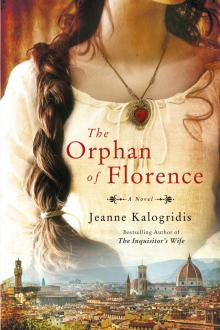 The Orphan of Florence
The Orphan of Florence Lord of the Vampires
Lord of the Vampires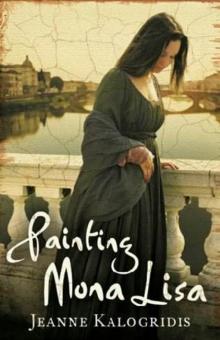 Painting Mona Lisa aka I, Mona Lisa
Painting Mona Lisa aka I, Mona Lisa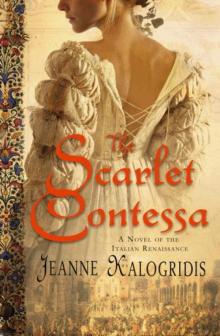 The Scarlet Contessa
The Scarlet Contessa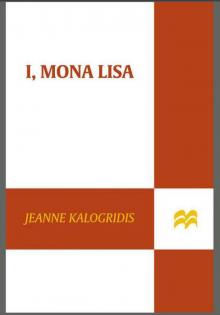 I, Mona Lisa
I, Mona Lisa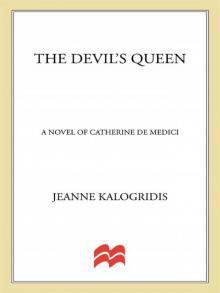 The Devil's Queen: A Novel of Catherine de Medici
The Devil's Queen: A Novel of Catherine de Medici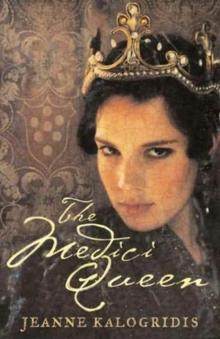 The Medici Queen aka The Devil’s Queen
The Medici Queen aka The Devil’s Queen The Inquisitor's Wife
The Inquisitor's Wife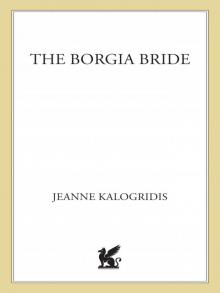 The Borgia Bride
The Borgia Bride